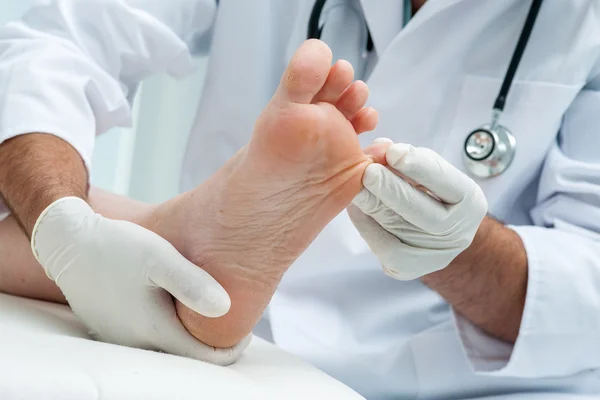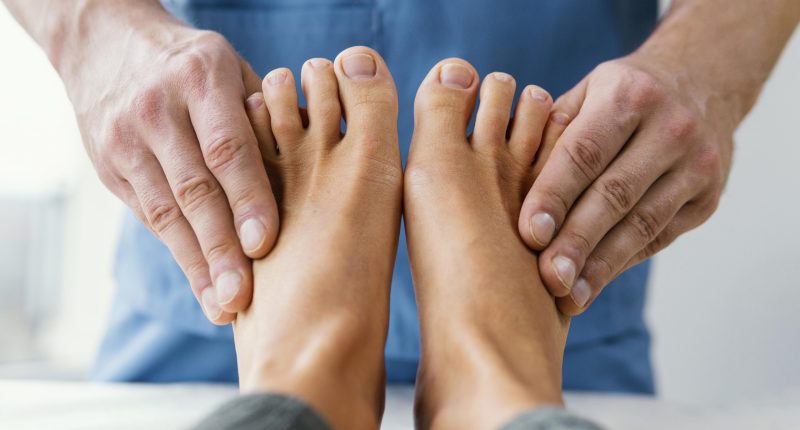Share this @internewscast.com
- Avoid Diabetic Foot Ulcers: Diabetic foot ulcers are a frequent and serious diabetes complication that can lead to amputation if not addressed.
- Risk factors encompass peripheral neuropathy, poor circulation, elevated blood sugar levels, smoking, and improperly fitting shoes.
- Preventive actions include blood sugar management, daily foot checks, proper foot care, suitable footwear, and refraining from smoking.
- Seek prompt medical advice for any open wounds, non-healing ulcers, infection signs, or new numbness or tingling in the feet.
- Pain absence doesn’t equate to no issues; regular foot examinations are vital for timely detection.
Managing diabetes involves attentive blood sugar level control to prevent various health issues, including diabetic foot ulcers. These ulcers manifest as open sores on the feet of individuals with diabetes and can result in severe outcomes if untreated. Approximately 15 to 20% of those with diabetes develop foot ulcers, making their prevention and early detection imperative. This guide offers vital insights on recognizing risk factors, preventing ulcers, and understanding when to seek medical assistance, aiding in maintaining healthy feet and overall wellness.

Who Is Most at Risk for Diabetic Foot Pain and Ulcers?
Several factors elevate the risk of developing diabetic foot ulcers. Being aware of these risks can assist in taking steps to safeguard your feet.
- Peripheral Neuropathy/Nerve Damage: High blood sugar levels can damage nerves, leading to a loss of sensation in the feet. This condition, known as diabetic neuropathy, makes it difficult to detect minor injuries, cuts, or blisters, allowing them to worsen unnoticed.
- Peripheral Artery Disease (PAD): Diabetes can cause narrowing of the arteries, reducing blood flow to the feet. Poor circulation impairs the body’s ability to heal and fight infections, increasing the risk of ulcer development.
- High Blood Sugar Levels: Persistently elevated blood sugar levels can damage blood vessels and nerves, contributing to both neuropathy and poor circulation.
- Other Risk Factors: Additional factors include older age, prolonged duration of diabetes, smoking, obesity, hypertension, a history of foot ulcers, foot deformities (such as bunions or hammertoe), and wearing improperly fitting shoes.
5 Expert-Approved Ways to Prevent a Diabetic Foot Ulcer
Preventing diabetic foot ulcers requires a mix of active foot care and effective diabetes management. Here are five key strategies to include in your daily routine:
- Manage Blood Sugar Levels: Keeping blood sugar levels within the target range is crucial for preventing nerve damage and circulatory problems. Before meals, aim for a blood sugar level of 80-130 mg/dL and under 180 mg/dL after meals.
- Daily Foot Inspections: Regularly inspect your feet for any signs of cuts, blisters, redness, swelling, or other abnormalities. Use a mirror to examine the bottoms of your feet if needed. Early detection of minor injuries can prevent them from developing into ulcers.
- Proper Foot Hygiene: Wash your feet daily with lukewarm water and mild soap. Dry them thoroughly, especially between the toes, to prevent fungal infections. Apply a moisturizer to keep the skin hydrated and prevent cracks.
- Choose Appropriate Footwear: Wear shoes that fit well and provide adequate support. Avoid tight shoes that can cause rubbing and blisters. Orthopedic shoes can be custom-fitted to accommodate foot deformities. Always wear socks to protect your feet from direct contact with shoes.
- Avoid Smoking: Smoking impairs circulation, exacerbating blood flow problems and reducing sensation in the feet. Quitting smoking can significantly improve foot health and reduce the risk of ulcer development.
When to See a Doctor About a Foot Ulcer That Won’t Heal
Early medical intervention is crucial for preventing complications from diabetic foot ulcers. Contact your healthcare provider promptly if you experience any of the following:
- An Open Wound: Any open sore on your foot, regardless of size, should be evaluated by a podiatrist. Even small wounds can quickly become infected in people with diabetes.
- Non-Healing Ulcer: If a foot ulcer does not show signs of healing within a week or two, it requires immediate medical attention. Delayed healing may indicate an infection or poor circulation.
- Signs of Infection: Be vigilant for signs of infection, such as increased redness, swelling, warmth around the ulcer, pus or foul-smelling drainage, fever, or chills. Infected ulcers can lead to severe complications like gangrene or sepsis.
- Numbness or Tingling: New or worsening numbness, tingling, or loss of sensation in your feet can indicate nerve damage. A foot doctor can assess nerve function and recommend preventive measures.
The Bottom Line: Why Feeling ‘No Pain’ Could Be a Hidden Danger
One of the most insidious aspects of diabetic foot ulcers is that they can develop without causing pain. This is due to nerve damage (neuropathy), which impairs the ability to feel discomfort or pain in the feet. As a result, individuals may be unaware of injuries or sores until they become severely infected.
The absence of pain should not be interpreted as a sign that everything is fine. Regular foot inspections are essential, even if you feel no discomfort. If you have diabetes, make foot care a priority and consult your healthcare provider immediately if you notice any abnormalities. Early detection and treatment are key to preventing serious complications and maintaining healthy feet.
Also Read | Eat Your Way to a Healthy Heart: Foods That Lower Cholesterol Naturally
We offer the most up-to-date information from top experts, new research, and health agencies, but our content is not meant to be a substitute for professional guidance. When it comes to the medication you’re taking or any other health questions you have, always consult your healthcare provider directly.

















